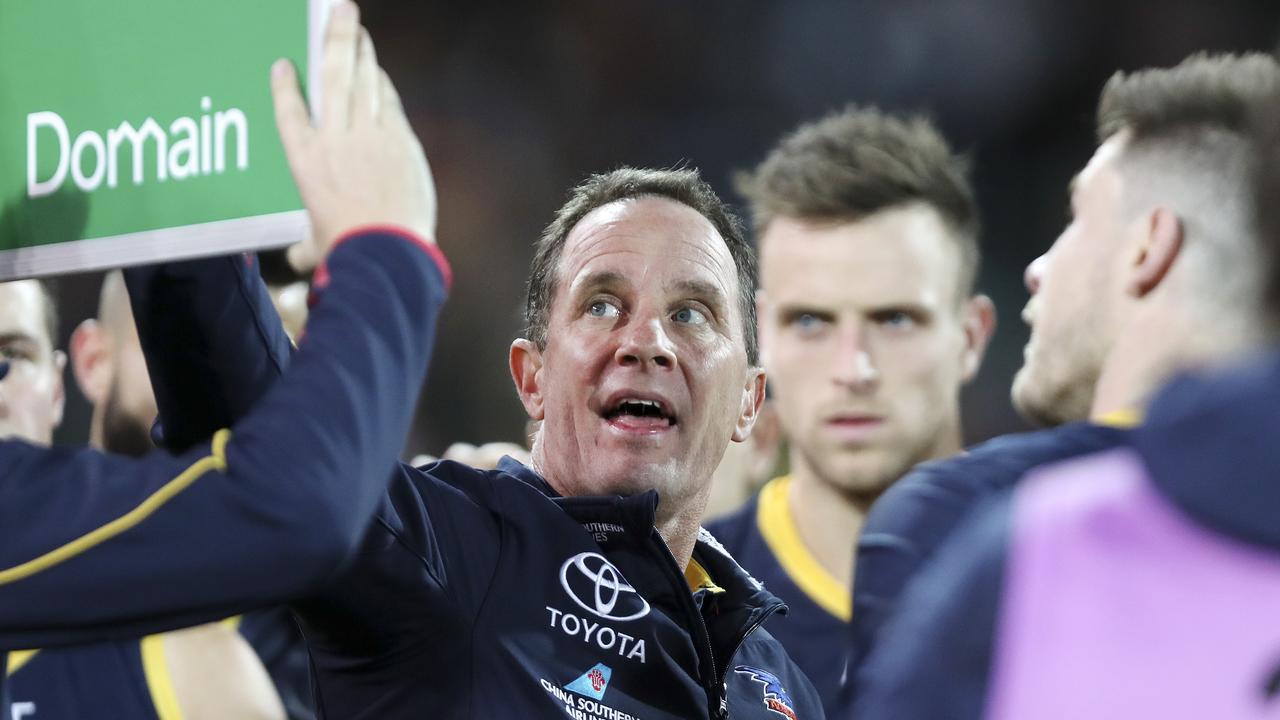Crows coach Don Pyke wants his team to play on instinct with rule change forcing a major reshuffle
Adelaide coach Don Pyke wants the Crows to play more on instinct this season as the AFL’s new starting position rule forces them to change more than any team in the competition.

- Cracking the Crow code
- Which AFL club does the best deal for members?
- Why Rory is barometer for Crows
- Crows dial in with new landmark sponsorship
- Talia confident for Round 1 after bizarre bed injury
Adelaide coach Don Pyke wants the Crows to play more on instinct this season as the AFL’s new starting position rule forces them to change more than any team in the competition.
The shackles are coming off the Crows that lined up with two men behind the ball at 29 per cent of centre bounces and with one man back at nearly half the time last year.
According to Champion Data the next closest team with an 8:6:4 (defence, midfield, forward) centre bounce set up was Richmond at 11 per cent while grand finalists Collingwood and West Coast went with the formation less than one per cent of bounces.
The new rule means teams must start with six forwards and six defenders in the 50m arcs including one forward in the goalsquare, which is designed to ease congestion and increase sc
oring.
Pyke said the Crows had implemented it in training and seen significant changes to centre bounce contests.
“We’re finding already when we practice it, it does open up that centre area quite a lot,” he said.
“They (extra numbers) eventually arrive but not right off the square because they’re coming from on average another 5-10 metres back.
“We’ve been exploring a number of things in terms of positioning from our forwards, backs and wings and how that looks ahead of the game, so it is a game-changer because it is going to create a genuine 4 v 4 for those centre square guys for probably another 2-3 seconds longer.

“It doesn’t change things from a philosophical viewpoint but there’s a bit more space there so it’s how you structure up and the personnel in there that’s something you need to consider because they’re going to be defending a bigger area.
“We did a number of things outside the square last year and our numbers inside the square weren’t good enough.
“In some ways we were supporting from outside the square with other numbers, not because we were trying to plug holes, it was the way that was flowing for us.”
Adelaide missed the finals last year after slipping from the No.1 ranked scoring team from defensive-half chains to 14th, and ranked last with Gold Coast and Carlton for ball movement from defence into attack.
Pyke believes they played safe footy too often and at the season launch last month said he was reminded of that while watching the Australian Open tennis.

Emerging Australian star Ash Barty was on the verge of eliminating five-time grand slam champion Maria Sharapova when she started playing what Pyke called “safe”, and was placing her shots rather than hitting through them as she had done earlier in the match.
“And you see that in golf, I watch a bit of golf, and guys with a two-shot lead start thinking ‘do I pull the driver out?’ when they’ve been hitting the driver well all day just back yourself and hit driver,” Pyke told The Advertiser.
“But it’s easy to take the iron and then mentally all of a sudden you’ve just changed your view.
“On the PGA Tour you see young guys who are in a position to win a tournament for the first time and they’ll get to the 14th or 15th with a one-shot lead and they change, they start to slow down, they over-analyse, over-think, make sure they look at the putt from every angle.
“All of a sudden they get out of their own routine and rhythm and they change how they’re playing the game and are more prone to making errors.
“It’s not natural, it’s not instinctive. They’re trying to be ultra safe and by trying to remove the error they actually introduce it to their brain for the first time.
“That’s a specific example at the end of a game but for us (last year) we weren’t playing with the flow that we’d previously had, so looking forward I thought ‘we’ll play our best football when we play brave, back ourselves in, proactive type footy’.
“It’s always been the message since I arrived, that we want to play with an attacking mindset.
“When we’re instinctive, we’re not overly clouded with thought and are playing the game and taking the options as they present.
“Providing those options is a component of that as well but generally sides who play instinctively and on the same page have success.”




